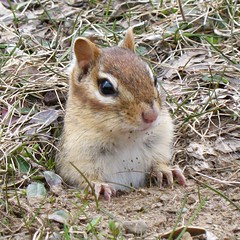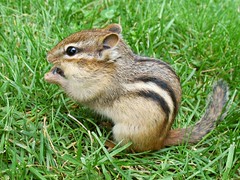 Image by Gilles Gonthier via Flickr
Image by Gilles Gonthier via FlickrEastern Chipmunks’ lifespan on average is only one year due to predators and man made dangers. They have two breeding seasons. The first begins in February and the second in June. They can have up to nine babies but average four.
Many people are frustrated by the amount of food they take away from bird feeding stations but chipmunks do have a purpose. They eat a lot of bugs, small rodents and stray seeds on the ground which humans can appreciate. And Mother Nature uses the chipmunks to spread plant seeds and fungi all around as well as food for birds of prey.
 Image via WikipediaEastern chipmunks live in shallow burrows made by digging and carrying away the dirt in their pouched mouths. These burrows can be up to 30 ft. in length with several different exits concealed with leaves and rocks.
Image via WikipediaEastern chipmunks live in shallow burrows made by digging and carrying away the dirt in their pouched mouths. These burrows can be up to 30 ft. in length with several different exits concealed with leaves and rocks. Image by Gilles Gonthier via FlickrThe chipmunks’ cheek pouches also transfer food to their tunnels. They keep large stores of food in their burrows and build nests on top of this treasure. Eastern chipmunks, however, do not hibernate continuously through the winter, nor do they "fatten up" before retreating to their burrows. When the temperatures reach freezing, chipmunks go into their burrows to hibernate but wake up periodically to snack on their stored nuts and seeds.
Image by Gilles Gonthier via FlickrThe chipmunks’ cheek pouches also transfer food to their tunnels. They keep large stores of food in their burrows and build nests on top of this treasure. Eastern chipmunks, however, do not hibernate continuously through the winter, nor do they "fatten up" before retreating to their burrows. When the temperatures reach freezing, chipmunks go into their burrows to hibernate but wake up periodically to snack on their stored nuts and seeds. Related article: How do I keep squirrels off my bird feeders?

No comments:
Post a Comment